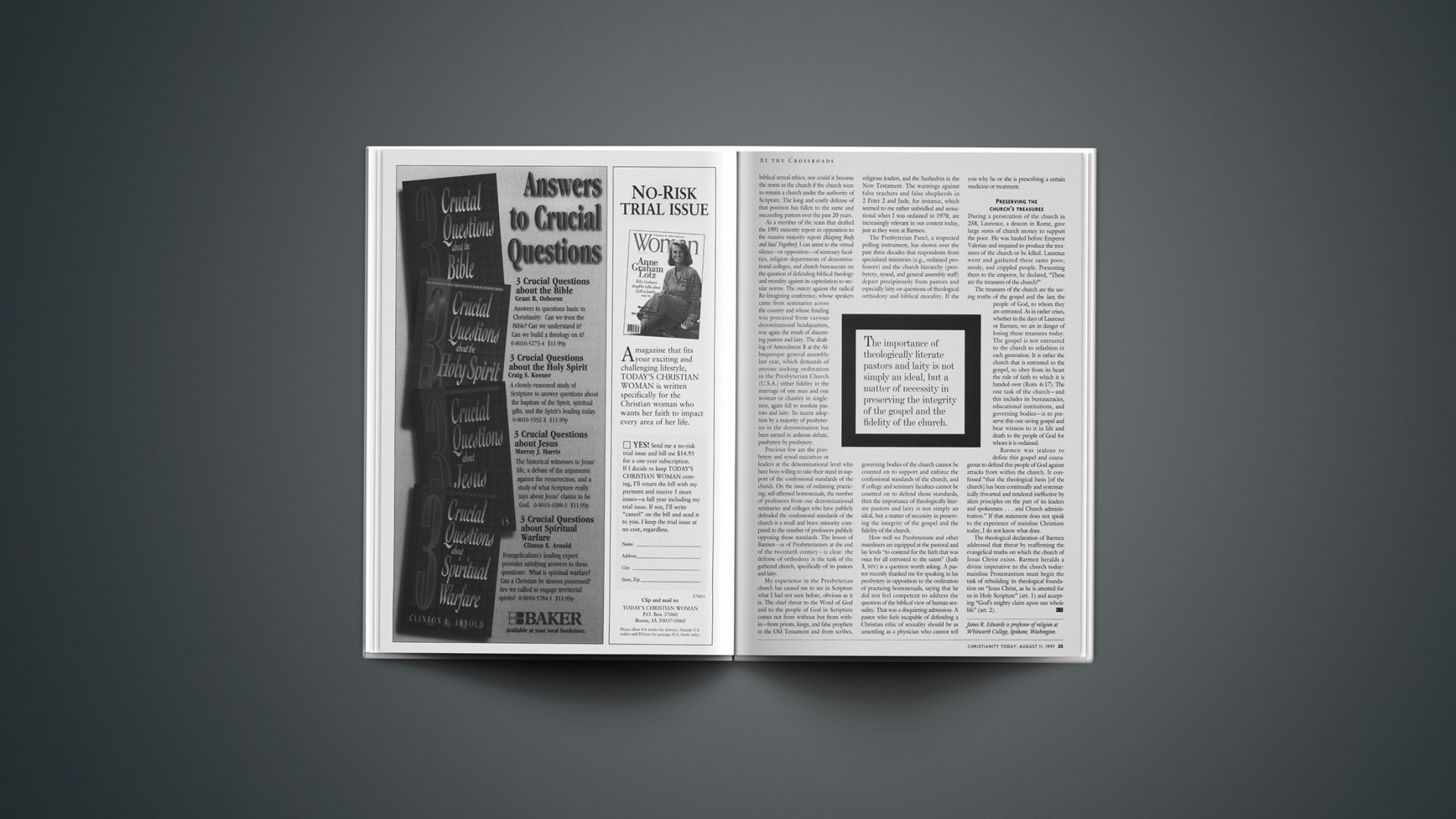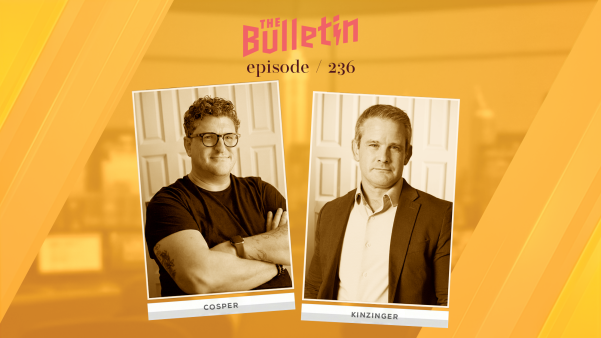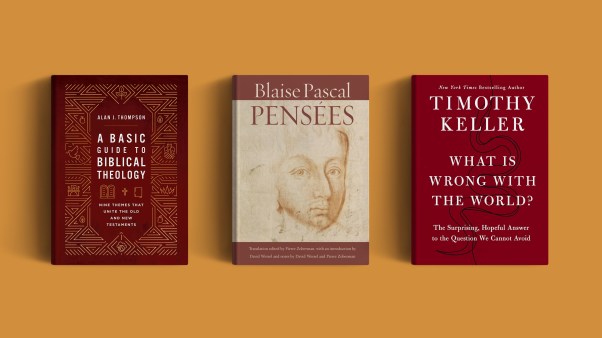Part two of two parts; click here to read part one.
Today, around 700 attend the Saturday night service, two-thirds of them with no church background. Ed Dobson wears ripped blue jeans and a T-shirt—a far cry from the Bob Jones days when he could not go to class without a tie, and his hair had to be off the ears, off the collar, and three finger widths above the eyebrows. He has been known to sport even a short ponytail. “Yes, the service feels entirely different from the three Sunday morning services, or the Sunday night service,” he says, “but there’s not much difference in what is said. Our purpose the whole weekend is exactly the same: We are gathering to pay attention to God.
“On Saturday night, blue jeans have a way of equalizing the social strata of the crowd, which is great. This last Saturday night I met a former crack addict. God is changing his life. In the same meeting were well-paid professionals.
“The questions scribbled on people’s cards at the end tell me what a wide variety I’m facing. A couple of weeks ago one of the questions was ‘Do I give up hooking [being a hooker] and then commit my life to Jesus Christ, or should I commit first and then give up hooking?’ ”
After someone comes to Christ in the Saturday night atmosphere, the move to Sunday morning is not as huge as one might imagine, Dobson says. While Sunday morning is traditional (the bulletin asks worshipers to refrain from applause during the service), the pastor is not afraid to rock the boat occasionally. One Lord’s Day he intentionally kept his clothing and hair style from the night before. “I was preaching about how Christians get concerned about things that don’t matter while not getting concerned about things that do matter. I preached the whole sermon without saying a word about my appearance. I talked about compassion for people in our community who are marginalized, disadvantaged—about breaking out of our circles of security.
“Finally, at the end, I said, ‘Now some of you today have been more upset about my ponytail than you are about people not getting Christ’s gospel and Christ’s love. The truth is, ponytails don’t matter—but people do. I’m going to cut my ponytail. What are you going to do about your neighbors?’
“They remembered that one!”
Reaching Out A couple of years ago, Dobson brought together nine or so African-American pastors in Grand Rapids to say, “We’ve just finished paying off our most recent building project at Calvary. That means the Lord has helped us raise $15 million over the last 12 years for our plant. Now we’d like to raise another $15 million over the next 12 years to give away—part of it here in Grand Rapids—to bring about racial healing. But we don’t know what to propose. Can you help me?”
Out of that discussion emerged the Emanuel Empowerment Corporation, an aggregate of Calvary and 12 key black churches, from Baptist to Pentecostal to A.M.E. Some are as large as a thousand members, while others are storefronts. Among their joint efforts have been:
—An eight-week summer program for 125 kids, ages 8 to 14, providing everything from remedial tutoring to whitewater rafting to Bible classes to museum trips to Detroit and Chicago. The hired staff were all certified public and Christian schoolteachers, black and white.
—A combined outdoor church service on the banks of the Grand River to demonstrate unity in Christ. Close to 5,000 attended; the combined 200-voice choir was 70 percent nonwhite.
—Business leaders’ luncheons at which Dobson and others have spoken on the issue of racism in the community.
—A citywide youth crusade on the streets, sending out teams of teenagers intermingled from all the churches to do drama, gymnastics, and music.
Dobson continues to meet with these pastors every other week, calling them his closest friends in ministry. “We talk all the time about how you can’t pass enough legislation to do away with racism. This is a heart issue.
“That’s why we work together to make public statements and examples to our city about what Christ can do in the human heart.”
Dobson has taken much the same approach on a more controversial issue: befriending those with AIDS. He started by calling a national hotline for information—which put him in touch with a local secular agency—which referred him to the local Metropolitan Community Church pastor. Dobson was not put off; he called the man and suggested they meet at either office. The homosexual pastor replied, “Let’s meet at your church. I’ve always wanted to walk in there.”
The conversation started with open acknowledgment that the two men disagreed on sexual ethics. Dobson then moved along to ask what Calvary could do for people suffering with aids. Today, church families buy Christmas presents for everyone they can identify in the city who is HIV-positive. Calvary has also offered funds and the use of its chapel for any AIDS-related funeral.
In the beginning, a few parishioners worried that their respectable church might be “overrun” with gays. Dobson decided to hit the issue head-on. “If our church gets overrun with homosexuals, that will be terrific,” he proclaimed one Sunday morning. “They can take their place in the pews right next to the liars, gossips, materialists, and the rest of us who entertain sin in our lives.” People quickly got a new picture of outreach in the 1990s.
“We don’t have a separate ministry per se to homosexuals,” Dobson says. “We just make it obvious that they, including people with hiv, are welcome here. Today our congregation includes a man who used to be such a gay activist he once threw eggs at Jerry Falwell and Anita Bryant. Then God got hold of his life. Today he’s married and has children.
“Last Christmas he was in a wheelchair; we thought he was dying. We found out he had one unfulfilled dream: to take his family to Disney World. So we passed the plate on Saturday night to send them, along with a video camera so we could have a report when they got back.
“Since then, however, his health has rebounded. He’s still with us.
“When I introduce this kind of guy in the church, hug him, and say, ‘Let’s all pray for him,’ it sends a powerful message about our attitude toward AIDS.”
That message has traveled as far as the World Council of Churches, which invited Ed Dobson to sit on an hiv consulting group the past two and a half years. A white paper on ministry to the infected will emerge soon. What will it say? “Some things I like, and some things I don’t like!” Dobson replies. “But it’s been interesting to discover how much my perspective has aligned with delegates from Asia and Africa.”
The news also traveled to the White House, resulting in a breakfast invitation when a dozen or so ministers discussed HIV with President Clinton. Ed Dobson had been to the building twice in the Reagan era for brief meetings with staffers, but this time he ended up sitting next to the President himself. “I told him, ‘When some of my friends discover that I came and met with you, it will not sit well. And when they hear that I sat on your left, it will be all over!’ ”
Once the meeting got down to business, Dobson spoke straightforwardly about his belief in loving and helping sufferers even while disagreeing with their world-view. The President took copious notes. At the end, when the group stood and joined hands for a closing prayer, he asked Dobson to lead.
What’s unique about Dobson, says his friend Nelson Keener, is that “he can toe the line on evangelical theology, and at the same time lead evangelicals past some of their safe boundaries. He has the skill and diplomacy to pull it off.”
The Main Thing This kind of outreach is more than a political crusade. Ed Dobson is pleased that Calvary currently gives away 37 percent of its income for social outreach and mission. (“Our goal is 50 percent.”) The church leadership endorses Dobson’s belief that Calvary, as a church, should steer clear of partisan politics—even though the membership includes several state legislators and the chairperson of the state Republican party. “When I came to Grand Rapids,” Dobson says, “I decided God had called us to carry the gospel to Democrats, Republicans, independents, and unregistered immigrants! That meant that if I aligned myself publicly with a party, I would by default alienate whoever disagrees with that party.
“I’m speaking as a pastor now, not as an individual. I am not saying Christians have no business in politics. Individual citizens have many responsibilities and opportunities. But pastors are different. If they engage in political involvement, they contaminate the gospel.”
When PBS came to interview him for its series With God on Our Side, Dobson told the reporter, “I was politically naive. I assumed that if we elected the right man, all our problems were solved. I didn’t understand that much of politics is simply about the business of ‘throwing dog biscuits’ ” to various constituencies.
These days Dobson looks elsewhere for answers to societal problems. He was invited recently to give a devotional at a luncheon where the agenda seemed to center on the country’s ills. “At the table where I sat, they must have talked for 30 minutes about how America is almost hopeless now.
“Finally, the emcee introduced me. I stood up and said, in essence, ‘Whenever I hear all about our country’s moral problems, I get so excited! Politics does not have a solution; education doesn’t; the business world doesn’t; psychotherapy doesn’t. While each of them offers some piece of assistance, the only real solution is Jesus Christ and his gospel.
” ‘If ever there was a time for the church to be fired up, it’s now. These are the greatest days to minister.’ ”
The “education” of Ed Dobson has come a long way, and he looks back with gratitude at every stage. “My father influenced me to preach the Bible verse by verse,” he says. “At Bob Jones University, I learned to do the right thing even if the whole world stands against you. From Jerry Falwell, I learned to pray, trust God, and expect him to do something significant. Here, in Grand Rapids, I’ve learned to stick to what matters: preach the Bible, love people, and stay out of everything else.”
Dean Merrill is vice president and publisher of the International Bible Society and the author of the forthcoming book Sinners in the Hands of an Angry Church (Zondervan).
Copyright © 1997 Christianity Today. Click for reprint information.










